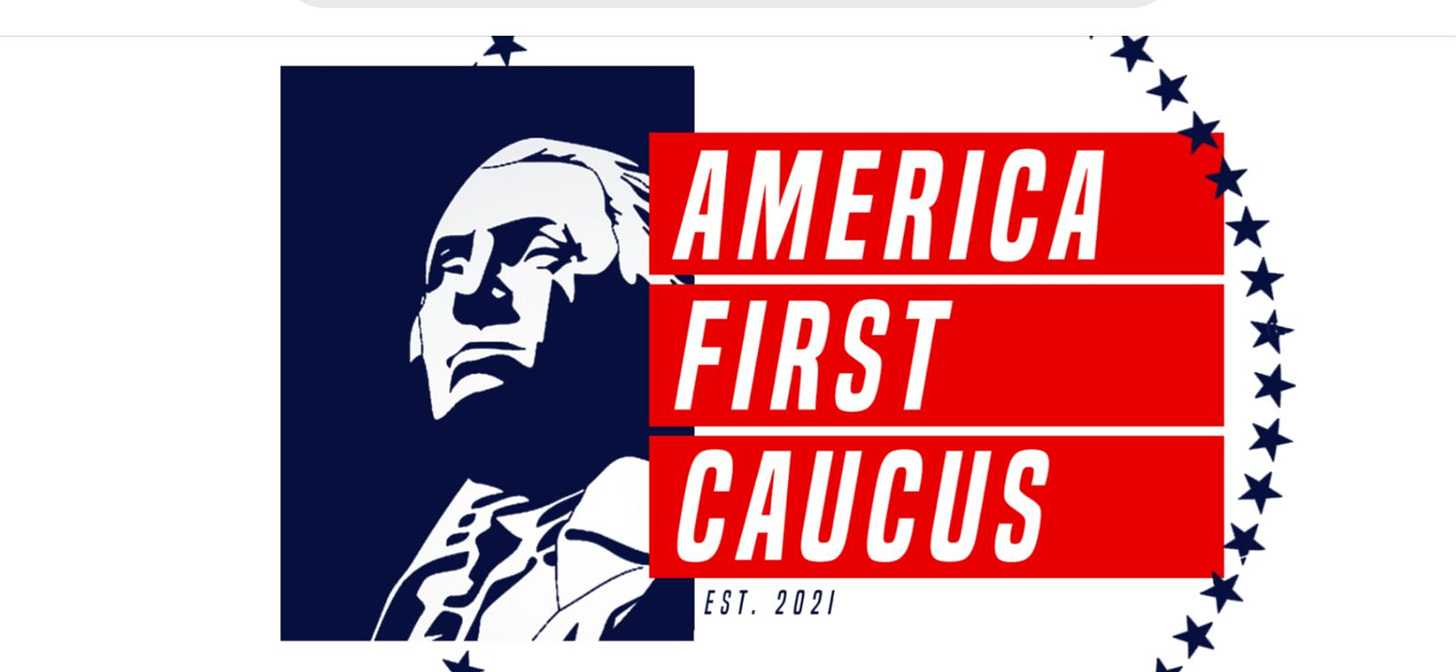The two big stories on my mind that I haven’t yet discussed are the withdrawal from Afghanistan and the new Anglo-Saxon caucus in the Republican Party. As the famed blues singer Calhoun Tubbs said, “Want to hear about it? Here it goes!”
A few years ago, I wouldn’t have believed that I would go almost a week without denouncing the proposed Afghanistan withdrawal, but President Biden’s announcement caught me in a busy work week followed by an anniversary trip. Don’t take my silence for consent, however. I’m one of the few Americans left who still believes that we have an important role to play in Afghanistan.

How many Americans were even aware that we still had troops in Afghanistan? Most probably haven’t given it much thought in years. Why? Because death tolls aren’t front-page news anymore.
As of January, the US only had 2,500 troops left in-country. In 2020, the US only lost 11 soldiers in Afghanistan during the entire year. These deaths are still tragic, but at less than one per month, the effort is very sustainable.
Likewise, the financial cost of the war in Afghanistan was only $52 billion in 2019. Although this sounds like a lot, it represents only about 0.2 percent of the COVID relief bill, not to mention the full federal budget.
Still, why should we spend the money when we are deeply in debt? For the answer, let’s look back in history to the 1980s, a time when music was at its cultural peak, hair was big, legs were warmed by cloth accessories, I was in high school, and the Russians were in Afghanistan.
The Soviet Union invaded Afghanistan in 1979 and fought a protracted guerilla war to prop up their puppet government in Kabul. Sound familiar? Thanks in part to US aid, mujaheddin fighters eventually persuaded the Soviets to leave in 1989. The war didn’t end at that point though.
Fighting continued, first against the communist government left by the Soviets, and then among the various Afghan factions. In 1996, as the US was celebrating the Olympic Games in Atlanta, the Taliban gained control over most of the country.
What followed was a humanitarian crisis as the radicals massacred opponents and dynamited historical sites. The situation developed into a security crisis when the Taliban gave refuge to Osama bin Ladin and al Qaeda.
And therein, lies one of the main reasons why we should stay. Nature abhors a vacuum and so does geopolitics. If the US doesn’t exercise control over Afghanistan, someone else will. That might be the Taliban or some other radical Islamic group or it might be Iran, the Russians, or the Chinese. Whoever it is, it won’t be as good for the US - or Afghanistan - as having Americans control the country.
I’m not deluded about the possibility of having Afghanistan become a functional democracy - that is likely decades away if it’s possible at all - but it is in our interest to project a stabilizing influence in the region, both to prevent the country from once again becoming a terrorist haven as well as to prevent another bloodbath of innocent civilians.
Additionally, giving up and going home reflects poorly on America as an ally. We now have a long history of abandoning our friends when the going gets tough. Recent examples include South Vietnam, the Kurds, the Iraqis, and now the Afghans. With friends like us, who needs enemies?
I’m also not under any illusions that those of us who favor staying in Afghanistan are anywhere near a majority. Both parties seem to have decided that the war is over, regardless of whether the enemy has been vanquished. President Trump had already set a May 1 deadline for withdrawal so Biden is leaving the troops in place longer than Trump would have. If Donald Trump was still president, I’d worry that we might continue the global retreat by leaving NATO and South Korea.
George Orwell once said, “The quickest way to end a war is to lose it,” but withdrawing Americans from Afghanistan won’t end that war, it will only move the conflict into a new and bloody phase, one that might require sending American soldiers back as we were forced to do in Iraq.
Both parties need to learn that deserting our allies is not the way to make America great or respected again.
Speaking of tribal conflicts, Rep. Marjorie Taylor Greene (Q-Ga.) seems to be the driving force behind a new America First Caucus. A platform document circulating on the internet that promotes the group says that the caucus will “follow in President Trump’s footsteps, and potentially step on some toes and sacrifice sacred cows for the good of the American nation.” You can read the full document, which appears to be genuine but may not have been intended for public release, on Punchbowl News.
The quotes that got the most attention from the media were where the platform advocated “uniquely Anglo-Saxon political traditions” and support for infrastructure “that reflects the architectural, engineering and aesthetic value that befits the progeny of European architecture.”
If there is any doubt about the aims of the caucus, the platform calls for new limits on legal immigration, saying, “America’s legal immigration system should be curtailed to those that can contribute not only economically, but have demonstrated respect for this nation’s culture and rule of law.” This is a very subjective standard, especially since crossing the border illegally to ask for asylum is in fact a form of legal immigration. If that sounds self-contradictory then you understand why the US needs to reform its immigration laws.
While the platform doesn’t go so far as to say that only “Anglo-Saxons” will be welcomed into either the caucus or the Republican Party, it is unquestionably a racial dog whistle. Actually, that’s not accurate. Dog whistles are veiled, suggestive statements while this one uses explicitly racial and ethnic terms.
And what is an “Anglo-Saxon” anyway? Britannica defines the group as “Germanic peoples who, from the 5th century CE to the time of the Norman Conquest (1066), inhabited and ruled territories that are today part of England and Wales.” In other words, “Anglo-Saxon” denotes a narrowly defined geographical ethnicity that represents about half of the United Kingdom. Apparently, Scots and Irish need not apply, much less Greeks, whose ancient philosophers and experiments in democracy inspired our own founders.
It’s pretty obvious that “Anglo-Saxon” and “European” as used here are code words for “white.” Even though the Spanish architecture of the forebears of our Latino countrymen may qualify under the “European architecture” clause, my guess is that “Anglo-Saxon” has a higher priority than “European.”
I’ve long said that the Republican Party cannot survive as a viable political entity as a primarily white party. CNN exit polls show that the white share of the electorate has declined from 77 percent in 2004 to 71 percent in 2016 and 67 percent in 2020. While the Republican share of the white vote has remained relatively constant at about 58 percent, this represents fewer and fewer voters as a share of the entire electorate.
Meanwhile, Democrats kept about 89 percent of the black vote and have seen their share of Latinos and Asians increase by about 10 percentage points over the same period. The Democrats are getting a larger share of a growing pie when it comes to minority voters.
Mitt Romney’s loss in 2012 prompted soul-searching and a post-mortem by Republicans. The report recommended increased outreach and sensitivity to minority groups, but Republican voters decided to take the opposite tack in 2016. The move worked against the worst mainstream party candidate in US presidential history but failed against a more traditional politician in 2020. The AFC platform doubles down on that wrong turn.
Make no mistake. The AFC platform is not a conservative document even if the racist parts are omitted (and they are racist by definition). Among the other planks are:
Voter suppression in the form of calling for “an end to mail-in voting”
Attacking the First Amendment and property rights of “Big Tech”
A promise to “direct as much money as possible to our domestic infrastructure needs”
Attacks on “hawkish neoconservative foreign policy” in Afghanistan, Iraq, and Libya that seem to wistfully recall the days when those countries were ruled by terrorist-supporting dictators
Isolation in the form of not continuing to be a “globalist watchdog”
Calling free trade “nefarious”
A good motto for the caucus might be, “Come for the white nationalism and isolationism, stay for the expansion of government!” While the platform doesn’t explicitly mention President Biden’s withdrawal from Afghanistan, but the retreat is one area where the America Firsters presumably agree with the Democrats.
In addition to Marjorie Taylor Greene, who is already backpedaling from the platform, the caucus has drawn the support of the rapidly imploding Matt Gaetz (R-Fla.) as well as Louis Gohmert (R-Texas) and Paul Gosar (R-Ariz.).
The America First Caucus serves to illustrate how divided the Republican Party continues to be. It also underscores how ethnocentric and anti-conservative one of those Republican factions is.
The America First wing of the GOP may be large enough to control the party, but, if so, it will be the big fish in a rapidly draining pond. Many Republicans have already been turned off by the party’s reaction to the 2020 election and the subsequent insurrection. If the party veers toward even more blatant white nationalism, it will no doubt scare off even more people. And it won’t be just minority voters who are part of the exodus from the GOP.

No comments:
Post a Comment